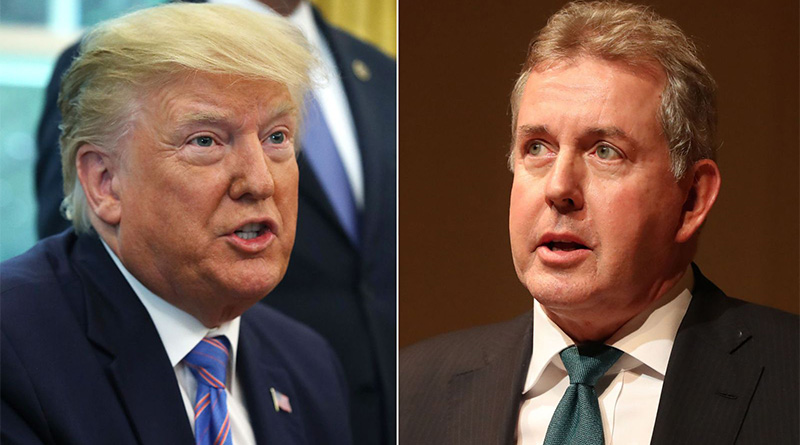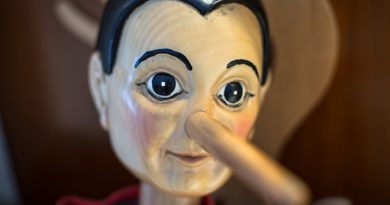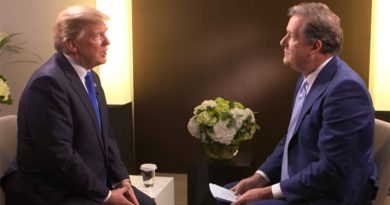Vitriol and bluster – another week in political communication
As I write, its been announced that the British ambassador to Washington, Sir Kim Darroch has resigned his position. According to the BBC, Darroch said:
“The current situation is making it impossible for me to carry out my role as I would like. Although my posting is not due to end until the end of this year, I believe in the current circumstances the responsible course is to allow the appointment of a new ambassador.”
I’ts been, even in the current climate, a turbulent in week in British politics. So lets back track a bit.
Last week the Mail on Sunday published leaked briefing notes and cables written by Darroch. In the confidential missives, he asserted that the Trump administration was inept, insecure and divided and that the President himself was “uniquely dysfunctional and his career could end in disgrace”. One of the most illuminating documents the Mail on Sunday saw, Darroch wrote:
‘We don’t really believe this Administration is going to become substantially more normal; less dysfunctional; less unpredictable; less faction riven; less diplomatically clumsy and inept.’
The immediate worry, of course, was whether such candid assessments would prove to be damaging the UK-US so called special relationship. Added to this, it seems extremely likely that the leak came from a British source, leading the chair of the House of Commons foreign affairs committee, Tom Tugendhat, to call what had happened a form of treachery.
Trump’s reaction to all this was predictable enough but perhaps even more vitriolic than expected. Via Twitter he pronounced that he did not know Darroch and that he was, “not liked or well thought of within the U.S. We will no longer deal with him.”
In further outbursts he labelled Darroch “wacky”, “very stupid” and “a pompous fool”. More evidence that tact and subtlety are not recognisably part of Trump’s repertoire.
Taking a sideswipe at outgoing Prime Minister May, in a move both vindictive and petty, POTUS also exclaimed that her handling of Brexit was “a mess” and a “disaster” and that “the good news for the wonderful United Kingdom is that they will soon have a new Prime Minister.”
The fact that the probable new PM will be Boris Johnson, a man who has previously accused Trump of stupefying ignorance and being “clearly out of his mind”, matters not. Look how Trump’s relationship with dictator Kim Jong Un has gone from the childishly insulting to the mutually approving.
One feature of both Trump and Johnson’s career is their cavalier attitude to public discourse. We seem to be in an age where sketchy undeliverable promises and personal bombast are lauded in some quarters as positive traits.
In Ipswich on Tuesday, members of the local conservative association told radio 5’s Nicky Campbell that it was Johnson’s charisma that was carrying him through. one contributor said, “Boris is intelligent, well read, articulate. He’s got strong opinions.” Another said, “”He is charismatic and a bit of a maverick – which is what we need”.
And it’s these opinions – rather than concrete policy ideas on how to actually deliver Brexit – that Johnson’s supporters are keen to believe will see us through. There was Bob Stewart MP earlier this week telling Emma Barnett about Johnson’s “personal stardust” that attracts people.
It is no accident that Johnson’s campaign strategy thus far has focussed on this perceived charisma. Contact with the wider electorate has been minimal, as has scrutiny from political journalists. Again and again we have seen him rely, in Jeremy Hunt’s word, on “bluster”.
In this strategy, many keen eyed political junkies will spot the influence of Lynton Crosby. He is the Australian spin doctor who masterminded the Tory election campaign of 2015 and Johnson’s successful bids for Mayor of London in 2008 and 2012.
Crosby is thought to speak to Johnson daily and in June stated that the next Prime Minister ought to “have character. The most successful politicians today are those who have some element of character.”
The fact that candidates sell themselves as individual characters, is not a new one, of course. The most effective post war politician of all, Mrs Thatcher, meticulously planned her public appearances to accentuate her personal authority. In the General election of 1983, for example, everything was managed and very little was spontaneous. Thatcher was supreme in front of the cameras – every evening news bulletin would see her driving a dump truck, or sorting peanuts in a factory, or operating a sophisticated computer system.
US influence was everywhere to be seen. Thatcher’s rallies resembled presidential conventions, with warm up music and Union flags provided for everybody to wave. The events were all ticketed, invitation only affairs. This produced audiences of devotees who ecstatically received addresses and helped portray the Prime Minister as powerful and confident. In this, Johnson matches Thatcher. What he lacks is her political certainty and devotion to detail.
The latest television debate, aired by ITV, was a fractious and disjointed affair characterised by interruption and in Johnson’s case, evasion and obfuscation. Hunt accused him of peddling optimism whilst Johnson insisted the nation comes off the “hamster wheel of doom”. Its only my opinion, of course, but I am amazed that even Tories fall for this.
But, as far as the Conservative Party today is concerned, Johnson’s sheer force of personality and “do or die” slogan to describe exit from the European Union on October 31st appears to be enough to persuade the majority to vote for him as party leader and Prime Minister.
One last thing on the Kim Darroch controversy. Whilst most of the political hierarchy were vociferous in their support for the diplomat and how exposed he had become, there was one particular voice calling publicly for his removal.
On his LBC radio show, Brexit party leader Nigel Farage stated, “this man [Darroch] should not have been there after November 2016 after Trump got elected….Some of the comments he’s made go way beyond fair reporting…As soon as he’s gone, the better.”
In 2016 Trump tweeted: “Many people would like to see @Nigel Farage represent Great Britain as their Ambassador to the United States. He would do a great job!”




